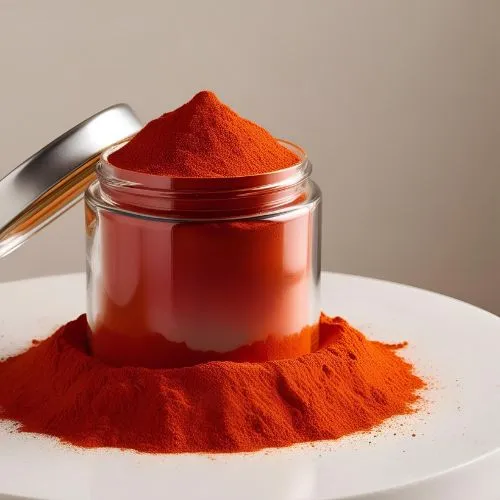Can Lycopene E160(d) Improve Your Immune System Health?
Lycopene E160d, a natural red pigment found abundantly in tomatoes and other red fruits and vegetables, has gained attention for its potential immune-boosting properties. As more people look for natural ways to support their immune systems, lycopene has emerged as a promising nutrient worth exploring. This article will examine the research on lycopene E160(d) and its effects on immunity to help you determine if it may benefit your health.

How Lycopene E160(d) Boosts Immunity Naturally?
Lycopene E160d works through several mechanisms to support immune function:
Antioxidant Protection
Lycopene, a powerful antioxidant, helps neutralize harmful free radicals and reduce oxidative stress in the body. This protects immune cells from damage, supporting their optimal function. Research shows that lycopene accumulates in immune tissues and organs such as the spleen, lymph nodes, and thymus gland, enhancing immune response and promoting overall health. Its antioxidant properties play a crucial role in maintaining a healthy immune system.
Anti-Inflammatory Effects
Chronic inflammation can weaken immune function over time. Lycopene helps regulate inflammatory responses by inhibiting pro-inflammatory enzymes and cytokines. This anti-inflammatory effect supports a balanced immune system, promoting its ability to respond effectively. By controlling inflammation, lycopene contributes to maintaining overall immune health, ensuring the body can function optimally and defend against potential threats.
Enhanced T-Cell Activity
Research indicates that lycopene E160(d) may enhance the production and activity of T-lymphocytes, crucial white blood cells involved in immune defense. Increased T-cell counts and improved function help the body more effectively recognize and eliminate pathogens. This boost in immune response strengthens the body’s ability to fight off infections and maintain overall health. Lycopene’s role in supporting T-cell activity contributes to a robust immune system.
Improved Natural Killer Cell Function
Natural killer (NK) cells are essential for innate immunity, targeting and destroying virus-infected and cancerous cells. Research suggests that lycopene supplementation can boost both the quantity and activity of NK cells, strengthening this crucial first line of immune defense. By enhancing NK cell function, lycopene may improve the body’s ability to fight infections and cancer, supporting overall immune health and protection.

Lycopene E160(d): A Powerful Antioxidant for Immunity
The antioxidant properties of lycopene E160d are central to its immune-supporting effects:
Free Radical Scavenging
Lycopene is exceptionally efficient at quenching singlet oxygen molecules, which are highly reactive forms of oxygen that can damage cellular components. By neutralizing these and other free radicals, lycopene helps protect immune cells from oxidative injury.
Cellular Membrane Protection
The lipid-soluble nature of lycopene E160(d) allows it to incorporate into cell membranes, including those of immune cells. This positioning enables lycopene to intercept free radicals before they can damage the delicate membrane structure, preserving cellular integrity and function.
DNA Safeguarding
Oxidative damage to DNA can impair immune cell replication and function. Lycopene has been shown to reduce DNA oxidation and protect against mutations, helping maintain the genetic stability of immune cells.
Synergistic Effects
Lycopene works in synergy with other antioxidants like vitamin C and vitamin E, boosting their protective effects. This collaboration strengthens the body's antioxidant defense system, offering enhanced support for immune health and improving the body’s ability to fight oxidative stress and inflammation, promoting overall well-being.
Can Lycopene E160(d) Prevent Illness and Inflammation?
While more research is needed, early studies suggest lycopene E160d may help prevent certain illnesses and reduce inflammation:
Respiratory Infections
Some evidence suggests that higher lycopene intake may reduce the risk of respiratory infections. Lycopene's antioxidant and anti-inflammatory properties help protect lung tissue and strengthen respiratory immune defenses. By reducing inflammation and oxidative stress, lycopene supports overall lung health, enhancing the body's ability to fight infections and maintain optimal respiratory function.
Cardiovascular Health
Chronic inflammation is a key contributor to heart disease risk. Lycopene's anti-inflammatory properties may help protect cardiovascular health by reducing inflammation in blood vessels and enhancing endothelial function. This support for vascular health can improve blood flow, potentially lowering the risk of heart disease and promoting overall cardiovascular well-being.
Cancer Prevention
Though not definitive, some studies suggest that lycopene E160(d) intake may be linked to a lower risk of certain cancers, particularly prostate cancer. Lycopene’s antioxidant and immune-modulating properties could contribute to this protective effect, helping to prevent cancer development and supporting overall cellular health in the body.
Skin Health
Lycopene accumulates in the skin and may help protect against UV-induced inflammation and oxidative damage. Its antioxidant properties can reduce the impact of sun exposure, potentially lowering the risk of skin infections. Additionally, lycopene may enhance the skin's immune barrier function, helping to maintain skin health and resilience against environmental stressors, supporting overall protection and skin vitality.
Autoimmune Conditions
Lycopene's anti-inflammatory properties may help regulate overactive immune responses in autoimmune conditions. Although further research is required, lycopene shows potential as a natural way to manage inflammation in these disorders. Its ability to modulate immune function could offer a promising, supplementary approach to alleviating symptoms and improving the management of autoimmune diseases.

Conclusion
Lycopene E160(d) offers intriguing potential for supporting immune system health through its antioxidant, anti-inflammatory, and immune-modulating properties. While more research is needed to fully understand its effects, incorporating lycopene-rich foods or supplements into your diet may provide immune benefits. As always, consult with a healthcare professional before starting any new supplement regimen.
If you're interested in learning more about lycopene E160d and other natural plant extracts for immune support, we invite you to contact Yangge Biotech Co., Ltd. at info@yanggebiotech.com. Our team of experts can provide guidance on incorporating high-quality lycopene products into your health and wellness formulations.
References
1. Rao AV, Rao LG. Carotenoids and human health. Pharmacological Research. 2007;55(3):207-216.
2. Petyaev IM. Lycopene Deficiency in Ageing and Cardiovascular Disease. Oxidative Medicine and Cellular Longevity. 2016;2016:3218605.
3. Milani A, Basirnejad M, Shahbazi S, Bolhassani A. Carotenoids: biochemistry, pharmacology and treatment. British Journal of Pharmacology. 2017;174(11):1290-1324.
4. Mozos I, Stoian D, Caraba A, Malainer C, Horbańczuk JO, Atanasov AG. Lycopene and Vascular Health. Frontiers in Pharmacology. 2018;9:521.
5. Story EN, Kopec RE, Schwartz SJ, Harris GK. An Update on the Health Effects of Tomato Lycopene. Annual Review of Food Science and Technology. 2010;1:189-210.

Based on your location and order quantity, you will have the opportunity to receive a limited time free shipping promotion!

Who we are


